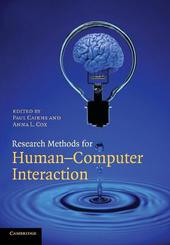
|
Research Methods for Human-Computer Interaction
Paperback / softback
Main Details
| Title |
Research Methods for Human-Computer Interaction
|
| Authors and Contributors |
Edited by Paul Cairns
|
|
Edited by Anna L. Cox
|
| Physical Properties |
| Format:Paperback / softback | | Pages:260 | | Dimensions(mm): Height 246,Width 174 |
|
| Category/Genre | Human-computer interaction |
|---|
| ISBN/Barcode |
9780521690317
|
| Classifications | Dewey:004.019 |
|---|
| Audience | | Postgraduate, Research & Scholarly | | Undergraduate | |
|---|
| Illustrations |
15 Tables, unspecified
|
|
Publishing Details |
| Publisher |
Cambridge University Press
|
| Imprint |
Cambridge University Press
|
| Publication Date |
21 August 2008 |
| Publication Country |
United Kingdom
|
Description
Human-Computer Interaction draws on the fields of computer science, psychology, cognitive science, and organisational and social sciences in order to understand how people use and experience interactive technology. Until now, researchers have been forced to return to the individual subjects to learn about research methods and how to adapt them to the particular challenges of HCI. This book provides a single resource through which a range of commonly used research methods in HCI are introduced. Chapters are authored by internationally leading HCI researchers who use examples from their own work to illustrate how the methods apply in an HCI context. Each chapter also contains key references to help researchers find out more about each method as it has been used in HCI. Topics covered include experimental design, use of eyetracking, qualitative research methods, cognitive modelling, how to develop new methodologies and writing up your research.
Author Biography
Paul Cairns is Senior Lecturer in Human-Computer Interaction in the Department of Computer Science at the University of York. Anna L. Cox is Lecturer in Human-Computer Interaction at the UCL Interaction Centre, University College London.
Reviews'Research Methods for Human-Computer Interaction is a wonderful resource for both students and practitioners who need to take a scientific approach to the design of user interfaces. It provides thorough introductions to many important topics. This is the first time that such a wide range of expert advice on the methods borrowed by HCI from other disciplines has been gathered into a single volume. It includes not only introductions to standard methods, but also recent advanced techniques, as well as a few alternative views from senior researchers who challenge conventional opinion.' Dr Alan Blackwell, Reader in Interdisciplinary Design, University of Cambridge Computer Laboratory
|